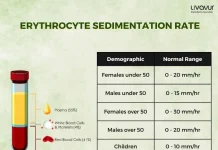This article is reviewed by Dr. Jyoti Lakhani

The esophagus is a long, hollow tube that connects your throat to your stomach. Esophageal cancer is a type of cancer that develops there. The food you swallow is moved through your esophagus from the back of your throat to your stomach so that it may be digested.
Usually, the cells that line the interior of the esophagus are where esophageal cancer develops. Anywhere along the esophagus is susceptible to esophageal cancer. Esophageal cancer affects more men than women. [1, 2]
Esophageal Cancer Symptoms
- Difficulty Swallowing (Dysphagia): A notable symptom of esophageal cancer is difficulty swallowing, often progressing over time.
- Unexplained Weight Loss: Sudden weight loss without intentional changes in diet or exercise could signal underlying health issues, including esophageal cancer.
- Chest Pain, Pressure, or Burning: Individuals with esophageal cancer may experience discomfort in the chest, characterized by pain, pressure, or a burning sensation.
- Worsening Indigestion or Heartburn: Persistent or worsening indigestion and heartburn could be indicative of esophageal issues, warranting medical attention.
- Coughing or Hoarseness: Chronic coughing or hoarseness that doesn’t resolve with common treatments may be associated with esophageal cancer.
In its early stages, esophageal cancer might not present noticeable symptoms, underscoring the importance of awareness, especially for individuals diagnosed with Barrett’s esophagus. Barrett’s esophagus, often resulting from chronic acid reflux, elevates the risk of esophageal cancer. Regular screenings and discussions with your healthcare provider can aid in timely detection and appropriate management, enhancing overall prognosis. If you encounter persistent symptoms or have concerns, scheduling a prompt medical evaluation is crucial for a comprehensive assessment. [1, 3]
Esophageal Cancer Causes
The etiology of esophageal cancer remains multifactorial, with several identified risk factors contributing to its development: [3]
- Tobacco Use: Both active smoking and smokeless tobacco consumption amplify the risk of esophageal cancer.
- Human Papillomavirus (HPV) Infection: HPV, a common viral infection, introduces tissue changes that may contribute to the development of esophageal cancer, affecting areas such as the vocal cords, mouth, hands, feet, and genitals.
- History of Head and Neck Cancer: Individuals with a prior history of cancer in the head or neck region are at an increased risk of esophageal cancer.
- Alcohol Consumption: Chronic and heavy alcohol use increases the likelihood of developing esophageal cancer.
- Obesity: Individuals with obesity face a heightened risk, potentially linked to the inflammatory milieu within the esophagus.
- Barrett’s Esophagus and Chronic Acid Reflux: Barrett’s esophagus, characterized by cellular changes in the lower esophagus due to chronic acid reflux, poses a significant risk factor. However, individuals with persistent heartburn are at an elevated risk even without this specific condition.
- Other Disorders: Certain rare and inherited conditions contribute to the complexity of esophageal cancer risk. Achalasia, an uncommon disorder impacting swallowing function, and tylosis, a rare genetic disease leading to excess skin growth on the palms and soles, are notable examples.
- Occupational Exposure to Chemicals: Prolonged exposure to specific chemicals, particularly those found in dry cleaning solvents, has been associated with a higher incidence of esophageal cancer.
Understanding these risk factors is crucial for preventive measures and the early detection of esophageal cancer in high-risk individuals. Regular medical check-ups and proactive lifestyle modifications can play pivotal roles in mitigating these risks.
Esophageal Cancer Diagnosis and Treatment
Diagnosing Esophageal Cancer:
Esophageal cancer is diagnosed through a thorough analysis of symptoms and medical history, as well as a number of diagnostic tests:
- Barium Swallow: A series of esophageal X-rays are taken with the use of a beverage containing barium to improve visibility.
- Computed Tomography (CT) Scan: A CT scan is used to evaluate the likelihood that tumours will spread to the chest and abdomen.
- Esophagogastroduodenoscopy (EGD): The esophagus is visually inspected using a flexible tube (endoscope).
- Esophageal Endoscopic Ultrasound: Often used in conjunction with an EGD, sound waves produce interior pictures of the esophagus.
- Biopsy: Tissue samples taken during an EGD are examined under a microscope for the presence of cancer cells.
Staging and Grading Esophageal Cancer:
Healthcare providers classify esophageal cancer based on factors like tumour location, depth, lymph node involvement, and distant metastasis. Tumor grades determine cell characteristics:
- Low-Grade Tumors: Slower growth and potentially less aggressive behaviour.
- High-Grade Tumors: Rapid cell division, indicating increased aggressiveness.
Treatment Approaches:
The choice of esophageal cancer treatment hinges on its stage and grade:
- Surgery (Esophagectomy): Common for early-stage cancer, involving removing part or most of the esophagus, often followed by reconstruction using a stomach segment.
- Radiation Therapy: Delivers targeted radiation beams, either before or after surgery.
- Chemotherapy: Utilized to kill or impede cancer cell growth.
- Endoscopic Submucosal Dissection (ESD): Applicable for very early-stage cancer.
- Endoscopic Mucosal Resection (EMR): Targets mucous lining tumours.
- Endoscopic Laser Therapy: Alleviates symptoms in cases where tumours obstruct the esophagus.
- Photodynamic Therapy (PDT): Destroys tumours through photosensitizer-activated chemical reactions.
- Targeted Therapy: Targets HER2 proteins in esophageal cancer cells.
- Immunotherapy: Involves immune checkpoint inhibitors to restore the immune system’s response.
Making informed decisions about the management of esophageal cancer is made easier for people when they are aware of the diagnosis and available treatments. Regular discussions with healthcare professionals guarantee individualized plans that are in line with the particular needs of each patient. [3]
According to the Charaka and Sushruta Samhitas, Ayurveda divides cancer into two categories: mild neoplasms (called Granthi) and big neoplasms (called Arbuda). Pathogens that impact the entire body and induce a disruption in the doshas are thought to be the primary reason. Through dietary changes, lifestyle modifications, and herbal remedies, ayurvedic medicine treats the vitiation of doshas. An imbalance in Vata, Pitta, and Kapha plays a role in the pathophysiology, which promotes excessive tissue growth. Despite the traditional concepts of Ayurveda, treating cancer is still a difficult and complicated problem. The use of Ayurvedic concepts in cancer treatment is a reflection of the increasing investigation of alternative methods for preventing & post-operative care of this severe illness. [4]
FAQs
What are esophageal cancer’s early signs and symptoms?
Early signs may include persistent coughing, chest pain, worsening indigestion, difficulty swallowing, unexplained weight loss, and weight loss. Early phases, though, could be asymptomatic.
Exactly how is esophageal cancer detected?
Symptom analysis and testing such as a biopsy, barium swallow, CT scan, EGD, and esophageal endoscopic ultrasound are used to make the diagnosis.
What are the causes of esophageal cancer risk factors?
Smoking, drinking, being overweight, having Barrett’s esophagus, having HPV infection, having a history of head and neck cancer, and being exposed to chemicals at work are risk factors.
What are the stages and grades of esophageal cancer?
Grading establishes cell characteristics, with low-grade tumours growing more slowly and high-grade tumours growing more aggressively. Staging evaluates tumour variables.
Which medical procedures can be used to treat esophageal cancer?
The following therapies are used in treatment: surgery, radiation therapy, chemotherapy, ESD, EMR, endoscopic laser therapy, PDT, targeted therapy, and immunotherapy.

















